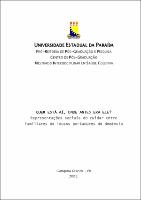| Compartilhamento |


|
Use este identificador para citar ou linkar para este item:
http://tede.bc.uepb.edu.br/jspui/handle/tede/2096Registro completo de metadados
| Campo DC | Valor | Idioma |
|---|---|---|
| dc.creator | Gaudencio, Mércia Maria Paiva | - |
| dc.creator.Lattes | http://lattes.cnpq.br/9116442087003643 | por |
| dc.contributor.advisor1 | Eulálio, Maria do Carmo | - |
| dc.contributor.advisor1Lattes | EULÁLIO, Maria Do Carmo | por |
| dc.contributor.referee1 | Luz, Madel Terezinha | - |
| dc.contributor.referee1Lattes | http://lattes.cnpq.br/5979565457174781 | por |
| dc.contributor.referee2 | Silveira, Maria de Fátima Araújo | - |
| dc.contributor.referee2Lattes | http://buscatextual.cnpq.br/buscatextual/visualizacv.do?id=K4768431Z5 | por |
| dc.date.accessioned | 2015-09-25T12:23:04Z | - |
| dc.date.available | 2009-09-16 | - |
| dc.date.issued | 2002-11-22 | - |
| dc.identifier.uri | http://tede.bc.uepb.edu.br/tede/jspui/handle/tede/2096 | - |
| dc.description.resumo | As relações de cuidar/cuidado, embora tão antigas quanto o homem, permanecem atuais e centrais para a compreensão dos sentidos atribuídos ao processo saúde/doença. Ao refletirmos sobre esta perspectiva e associa-la aos fatores envolvidos no processo de envelhecimento comprometido por uma patologia, no caso a doença demencial, emergiu a problemática do cuidador familiar. Uma das faces deste problema foi investigada, objetivando caracterizar os cuidadores e os idosos, bem como apreender e analisar as representações do cuidar/cuidado elaboradas por este grupo de sujeitos. Para tanto, a Teoria das Representações Sociais foi suporte e garantia de uma abordagem quanti-qualitativa de caráter multidisciplinar. O percurso metodológico empreendido resultou na organização de um corpus constituído por material discursivo coletado junto a vinte cuidadores, residentes na cidade de Campina Grande, PB. Para a coleta de dados foram utilizados um teste de associação-livre, entrevista semi-estruturada e questionário para a caracterização dos cuidadores e dos idosos. Para a análise, recorreu-se ao tratamento estatístico descritivo e à técnica da análise temática de conteúdo. Tais procedimentos possibilitaram a caracterização dos cuidadores e dos idosos, e viabilizaram a identificação de quatro categorias do cuidar/cuidado: manifestações pragmáticas, afetivas, de cunho filosófico e manifestações da temporalidade. Essas categorias são pólos representacionais em torno dos quais se articulam e se estruturam representações que indicam a transformação do estranho, que os quadros demenciais comportam, em familiar. Apontam, ainda os resultados, para o silêncio social em torno da problemática do cuidador de idosos demenciados, e, simultaneamente para a necessidade de se empreender investigações sobre uma temática tão próxima de todos nós, mas ainda tão invisível | por |
| dc.description.abstract | The care/cared relations, even as old as men, remain current and central to the comprehension of the senses attributed to the health/diasease process. On this perspective and in conjunction with the factors related to the population aging, in the demented illness and about the necessary care, it arises the problem of the demented old people family care-talcer. One of the sides of this problem was investigated with the purpose of characterizing the care and the old people, as well as aprehend and analyze the care/cared representation elaborated by this group of subjects. So, the Social Representation Theory was the support and guarantee of a quanti-qualitative approach of multidiscipline charater. The method used resulted in the organization of a coupus compounded by discursive material collecled with the help of twenty care-takers who live in the city of Campina Grande, PB. To collect data it was used a free-association test, semi-structured interview and a quiz to characterize the care-takers and the old sick people. To analyze it was uied a descriptive statistic treatment of the qualilied data and the technique of the collected speech content thematic analysis. Such procedures resulted in the characterization and context of the care-takers and old people and on the identification of 4 categories of care/cared: pragmatic manifestation, afective, philosophical aspect and temporal manifestation. These categories are representatives poles around cuhich articulate and structure representations that show the transformation of the strange, that the dement pictures involve, into a family. It indicales, yet, the results toward the social silence aroud the problem of the old demented people care-takers, and, simultaneously, toward to the necessity of carry on investigations about a theme so close to us, but still so invisible | eng |
| dc.description.provenance | Made available in DSpace on 2015-09-25T12:23:04Z (GMT). No. of bitstreams: 1 MerciaMariaPaivaGaudencio.pdf: 1144653 bytes, checksum: f0d6c0e8db35907fc305c12615b0f453 (MD5) Previous issue date: 2002-11-22 | eng |
| dc.format | application/pdf | por |
| dc.thumbnail.url | http://tede.bc.uepb.edu.br/jspui/retrieve/4107/MerciaMariaPaivaGaudencio.pdf.jpg | * |
| dc.language | por | por |
| dc.publisher | Universidade Estadual da Paraíba | por |
| dc.publisher.department | Promoção da Saúde | por |
| dc.publisher.country | BR | por |
| dc.publisher.initials | UEPB | por |
| dc.publisher.program | Mestrado Interdisciplinar em Saúde Coletiva | por |
| dc.rights | Acesso Aberto | por |
| dc.subject | Representação social | por |
| dc.subject | Cuidar | por |
| dc.subject | Cuidador | por |
| dc.subject | Família | por |
| dc.subject | Femência. | por |
| dc.subject | Social representation | eng |
| dc.subject | to take care | eng |
| dc.subject | healer | eng |
| dc.subject | family | eng |
| dc.subject | demency | eng |
| dc.subject.cnpq | CNPQ::CIENCIAS DA SAUDE::SAUDE COLETIVA | por |
| dc.title | QUEM ESTÁ AÍ, ONDE ANTES ERA ELE? Representações sociais do cuidar entre familiares de idosos portadores de demência | por |
| dc.type | Dissertação | por |
| Aparece nas coleções: | MISC - Dissertações | |
Arquivos associados a este item:
| Arquivo | Descrição | Tamanho | Formato | |
|---|---|---|---|---|
| MerciaMariaPaivaGaudencio.pdf | 1.12 MB | Adobe PDF |  Baixar/Abrir Pré-Visualizar |
Os itens no repositório estão protegidos por copyright, com todos os direitos reservados, salvo quando é indicado o contrário.




